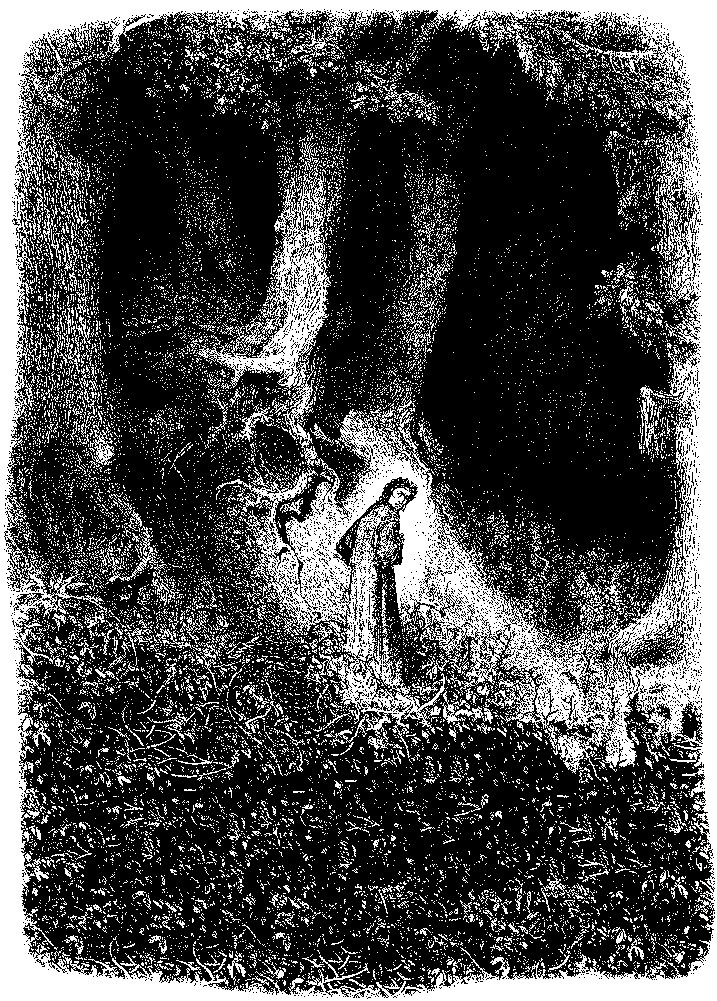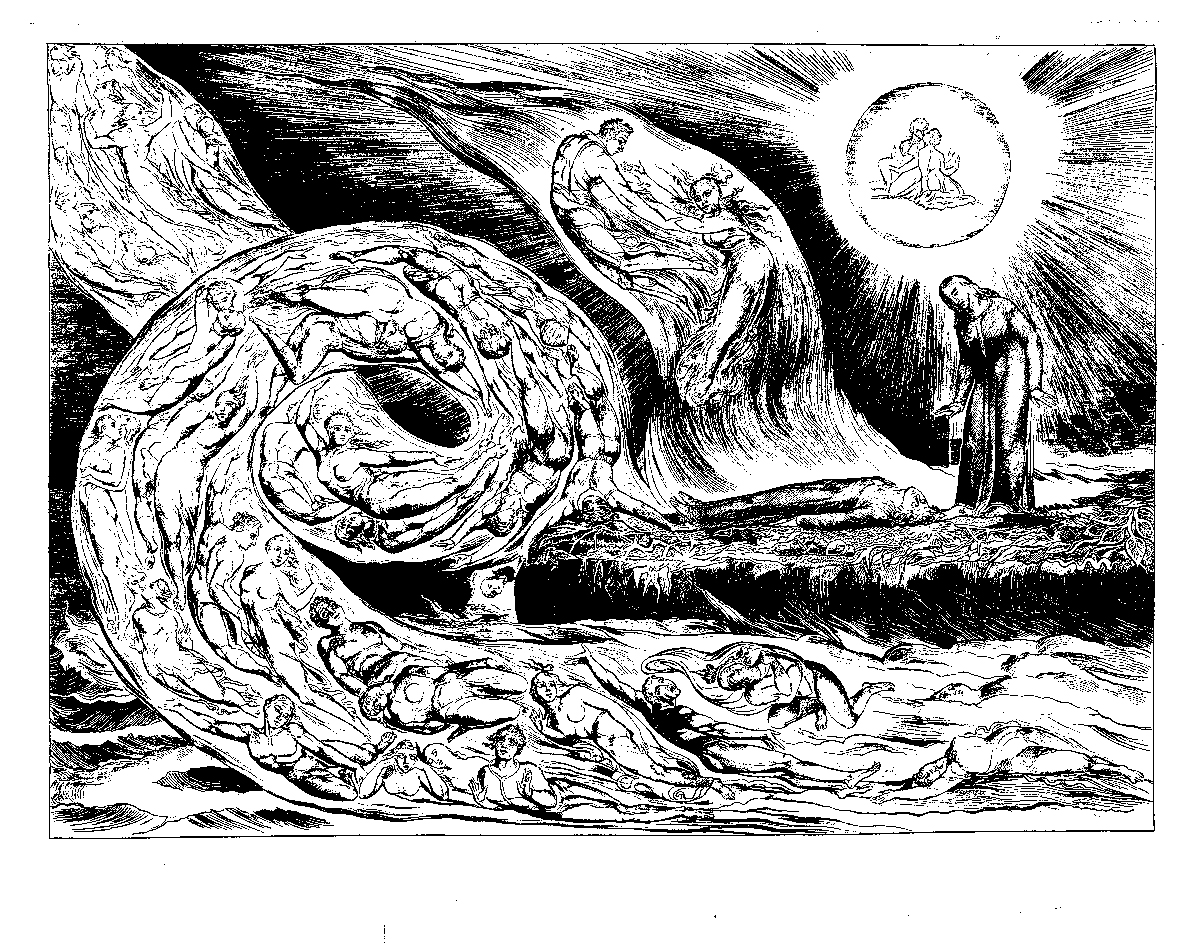I
Flattering Delusions
 The Divine Comedy
The Divine Comedy
Dante Alighieri, 1320
Inferno Canto 1
When I had journeyed half of our life’s way,
I found myself within a shadowed forest,
for I had lost the path that does not stray.
Ah, it is hard to speak of what it was,
that savage forest, dense and difficult,
which even in recall renews my fear:
so bitter—death is hardly more severe!
But to retell the good discovered there,
I’ll also tell the other things I saw.
I cannot clearly say how I had entered
the wood; I was so full of sleep just at
the point where I abandoned the true path.
To Double Business Bound
Rende Girard, 1978
The historical mutilation of mimesis. . . was no mere oversight, no fortuitous ‘error.’ Real awareness of mimetic desire threatens the flattering delusion we entertain not only about ourselves as individuals but also about the nature and origin of that collective self we call our society.
The Mimetic Desire of Paolo and Francesca
Rende Girard, 1978
Paolo and Francesca, the adulterous lovers of The Divine Comedy, enjoyed a very special popularity at the beginning of the nineteenth century. The two young people defy human and divine laws and appear to bring about the triumph of passion, even in the realm of eternity. What does Hell matter to them, since they are there together? In the minds of innumerable readers, in modern times as well as in the Romantic era, the infernal setting, however artistically remarkable it may be, is no more than a deferential nod in the direction of the moral and theological conventions of the time.
 Galleot (or Galehalt) is the treacherous knight, Arthur’s enemy, who sows the seeds of passion in the hearts of Lancelot and Guinevere. It is the book itself, Francesca maintains, that plays the role of the diabolical go-between, the pander, in her life. The young woman curses the romance and its author. There is no question of drawing our attention to any particular writer. Dante is not writing literary history; he is stressing that, whether written or oral, it has to be some person’s word that suggests desire. The book occupies in Francesca’s fate the place of the Word in the Fourth Gospel: the Word of man becomes the Word of the devil if it usurps the place of the divine Word in our souls.
Galleot (or Galehalt) is the treacherous knight, Arthur’s enemy, who sows the seeds of passion in the hearts of Lancelot and Guinevere. It is the book itself, Francesca maintains, that plays the role of the diabolical go-between, the pander, in her life. The young woman curses the romance and its author. There is no question of drawing our attention to any particular writer. Dante is not writing literary history; he is stressing that, whether written or oral, it has to be some person’s word that suggests desire. The book occupies in Francesca’s fate the place of the Word in the Fourth Gospel: the Word of man becomes the Word of the devil if it usurps the place of the divine Word in our souls.
Paolo and Francesca are the dupes of Lancelot and the queen, who are themselves the dupes of Galleot. And the romantic readers, in their turn, are dupes of Paolo and Francesca. The malignant prompting is a process perpetually renewed without its victims’ being aware of it. An identical internal censorship erases any cognizance of the mediator, suppresses all information contrary to the romantic solipsistic Weltanschauung. Georges Sand and Alfred de Musset, leaving for Italy, took themselves for Paolo and Francesca but never questioned their own spontaneity. Romanticism turns The Divine Comedy into a new novel of chivalry. It is an extremity of blindness that forces into the role of pander the very work that expressly denounces it.
The Francesca who speaks in the poem is no longer a dupe, but she owes her clear-sightedness to death. An imitator of imitators, she knows that the resemblance between her and her model is real (because one always obtains what one desires strongly). However, this resemblance does not consist in the triumph of an absolute passion, as the lovers at first imagined and as the readers imagine still, but in defeat, a defeat already accomplished at that moment when, in the shadow of the Lancelot story, the first kiss was exchanged.
Don Quixote, in his imitation of a chivalric model, courts the same quasidivinity as Paolo and Francesca. Like them, he spreads the evil of which he is a victim, He has his imitators and the novel of which he is the hero had its plagiarists. This fact allowed Cervantes, in the second part, to make his ironic prophecy about the insensate criticism that would rage around it once more with the Romantic period Umamuno, for instance, was to insult Cervantes, the novelist himself, for exhibiting a “lack of understanding” of his sublimely inspired hero. The individualist is not unaware that there exists a second, and deriva- tive, form of passion, but itis never, for him, “true passion,” that is to say, his own or his models. The genius of Dante, like that of Cervantes, is bound up with the abandonment of the preconceptions of individualism. That is why the very essence of their genius has been misunderstood by the Romanties and their suecessors of today."
Cervantes and Dante discover within the world of literature a whole territory of awareness that includes Shakespeare’s “play within a play” and Gide’s mise en abime. In connection with modern novels, the same writers also afford us a rendering of unhappy consciousness that differs significantly from that of Hegel.
The hero in the grip of some second-hand desire secks to conquer the being, the essence, of his model by as faithful an imitation as possible. If the hero lived in the same world as the model instead of being forever distanced from him by myth or history, as in the examples above, he would necessarily come to desire the same object. Theanearer the mediator, the more does the veneration that he inspires give way to hate and rivalry. Passion is no longer eternal. A Paolo who encountered Lancelot every day would no doubt prefer Queen Guinevere to Francesca unless he managed to link Francesca and his rival, making the rival desire her, so as to desire her the more himself—to desire her through him or rather against him, to tear her, in short, from that is a desire that transfigures her. It is this second possibility that is illustrated in Don Quixote by the story of "the inquisitive, impertinent man” and in Dostoevski by the short story of “The Eternal Husband. For novelists who write of internal mediation, it is envy and morbid jealousy that triumph, Stendhal speaks of “vanity,” Flaubert and his critics of Bovaryism; Proust reveals the workings of snobbery and of Tamour-jalousie.
The model in these instances is still an obstacle. At a lower level of “degradation,” every obstacle will serve as a model. Masochism and sadism are thus degraded forms of mediated desire. When the erotic attachment is displaced from the object onto the intermediary-rival, one has the type of homosexuality demonstrated by Marcel Proust. The divisions and agonies produced by mediation find their climax in the hallucination of the double, present in the work of numerous Romantic and modern writers but comprehended only by the greatest as a conflictual structure.
One must treat the great work of fiction as a single entity, a totality. The individual and collective history of secondhand desire always moves toward nothingness and death. A faithful description would elucidate a dynamic structure in the form of a descending spiral. How is it possible for the novelist to see the structures of desire? The vision of the totality is simultancously a vision of the whole and of the parts, of the detail and of the ensemble, It demands detachment and anything but detachment at one and the same time. The true novelist is neither the Olympian, inactive god whom Sartre describes in Qu’est-ce que la littérature? nor the committed man whom Sartre would like to substitute for the false God. The novelist must be at once committed and uncommitted. He is the man who has been caught in the structure of desire and has escaped from it. The Flaubert of La Premiere Education sentimentale, the Proust of Jean Santeuil, and Dostoevski before Notes from Underground present us with all the ambivalences gendered by mediation as objective outcomes of the world. Their vision remains shot through with Manicheism, All of them were “Romantics” before writing “novels.”
This initial captivity of the writer in illusion corresponds, in his major work, to the illusion, finally revealed as such, of the hero himself, The hero never frees himself until the end of the novel, through a conversion in which he rejects mediated desire, ie., death of the romantic self, and a resurrection in the true world of the novel. This is why death and disease are always physically present in the conclusion and why they always have the nature of a happy deliverance. The final conversion of the hero is a transposition of the novelists fundamental experience, of his renunciation of his own idols, of his own spiritual metamorphosis, In Le Temps retrouvé, Marcel Proust makes plain this reasoning, which is always present but veiled in the work of previous novelists.
The ending that is death for the world is birth for the creative world of the novel. We can verify this fact in quite concrete form in the chapter entitled “Conclusion” in Contre Sainte-Beuve and in other writings left by Proust. The preliminary drafts of Le Temps retrouvé boil down to a generalized testament of defeat, to an actual and literary despair that existed just before Proust began work on A la Recherche du temps perdu. We must use the same method for endings as for the worlds of the novel: we must envisage them as a single significant totality. What we find this time is not a continuous historical development but a dynamic form always virtually identical, though realized more or less perfectly in the work of individual novelists. The final revelation illuminates, retrospectively, the path traversed. The work is itself retrospective; it is at the same time narrative of and the recompense for spiritual metamorphosis. In the light of this metamorphosis, worldly existence, the spiral descent, appears as a descent into Hell, that is, as a necessary ordeal on the way to final revelation. The descending movement finishes by transforming itself into an ascending movement, without there being any going back. It is obvious, I believe, that this forms the structure of The Divine Comedy. And doubtless we must look back further still to define the archetype of the novel form—back to the Confessions of Saint Augustine, the first work whose genesis is truly inscribed in its form.
These observations emerge not only from theology but from phenomenology of the novel. I am not making any superficial attempt to “Christianize” novelists; and I am virtually saying the same thing as Lucien Goldmann when he writes:
The final conversion of Don Quixote or Julien Sorel is not …the attainment of authenticity or transcendence to a higher plane, but simply the recognition of the vanity and degraded character of not only the previous quest, but also of any hope, of any possible quest.
This sentence is even more true of Flaubert than of Stendhal and Cervantes. These novelists mark a “minimal” conversion in contrast with the “maximal” conversion of Dostoevski; but the Dantean and Augustinian archetype remains inscribed in the form of their work. The resort to Christian symbolism in the work of Stendhal or Proust is all the more striking in that it has no religious significance; and their work deliberately excludes all overt imitation of any recognizably Christian form.
The problem that presents itself here is not that of the ultimate meaning of reality but that of the “view of world views.” In the Confessions, there is this overview of a pagan view that is the Christian view; it is in the transition from one view to the other that the two views become visible. Dante’s Vita Nuova carries somewhat analogous implications; so does the transition from Romanticism to the novel, which may certainly be defined as “self-realization” but which can hardly be something simple and easy, something that occurs of its own accord, which Lucien Goldmann suggests in the quotation given above. In this regard his interpretation seems to me to be incompatible with his concept of world view and with the stability, the resistance to change that characterizes social and spiritual structures.
It may be argued that the Dantean archetype seems to reappear in works whose contents reflect widely different philosophies. Without wishing to minimize these divergences, we may note that there exist close analogies as well and that these analogies are not confined to novelists. One finds them, for example, in the work of Georg Lukics, whose theory of world views necessarily rests on a view of these world views, that is, on an experience somewhat similar to that of the novelist. There is something Dantean in Lukics’s approach. When he describes the degraded quests of fictional heroes as “demonic.” is he not giving us the metaphorical equivalent of that Hell where Dante immersed his own heroes? In The Meaning of Contemporary Realism, the following expressions often recur to describe the literature of the Western avant-garde: “infernal,” “diabolic,” “phantasmal,” “monstrous,” “grimacing,” “subterranean powers,” and “demonic principle.” One can, of course, accuse Lukics of being a little too severe on contemporary literature; but this reproach, however legitimate, and the somewhat facile irony evoked by his theological language must not let us lose sight of the profound intuition that language expresses. Freud, too, uses the term “demonic” to describe the morbidly repetitive nature of neurosis.
True religious thought, the great novels, psychoanalysis, and Marxism have this in common, that they are all opposed to any “fetishism.” We hear on all sides that Marxism is a “religion Judaism and primitive Christianity, equally fiercely iconoclastic, appeared to the pagan world to be forms of atheism at first. The accusation of fetishism is turned today against a Christianity that has often deserved it and that deserves it still; but it is this Christianity not be forgotten, that has handed on to us horror of fetishism in all its forms.
The irreplaceable quality of religious language forces us to ask whether the kind of thinking that first animated that language may not be more appropriate for dealing with actuality than is sometimes imagined. No mode of this thought strikes us as more antiquated and meaningless than patristic and medieval allegory, perhaps the progress of modern thought will oblige us to revise this judgment. It seems that nothing could be further removed from allegorical thought than the connection that Lucien Goldmann establishes between the world of desire in the novel and the market economy:
In economic life, which constitutes the most important aspect of life in modem society, every genuine relationship with the qualitative aspect of things and of beings tends to disappear—both relationships between men and things as well as between human beings—to be replaced by a mediated and degraded relationship: the purely quantitative relationship of exchange
values.
All particular idols are caught up together and engulfed by the supreme idol of the capitalist world: money. There is a “rigorous homology” between every condition of our existence. Our emotional life and even our spiritual life have the same structure as our economic life. The idea seems outrageous to a religious attitude that affirms the autonomy of “spiritual values” merely to provide better cover for mediation and degradation. But the Fathers of the Church—they who made money symbolically analogous to the Holy Ghost and the spiritual life—would have weleomed the Marsist insight. If money is becoming the center of human life it is also becoming the heart of an analogous system that replicates the structure of Christian redemption in reverse; that, in fact plunges us again into the Hell of Dante and the “demoniac” of Lukics and Freud. Allegorical thought may perhaps be something more than a literary game. To recognize the bonds that unite patristic mediation to the most advanced elements of contemporary thought is to discover a paradoxical unity of Western thought beyond the superficial divergences of beliefs and ideologies.
Notes on Desire
I Flattering Delusions
II The Funhouse
III Just Called to Say I Love You
IV American Psycho
V Models
VI Good Old Neon
VII Living Like Weasles
VII Goodbye
